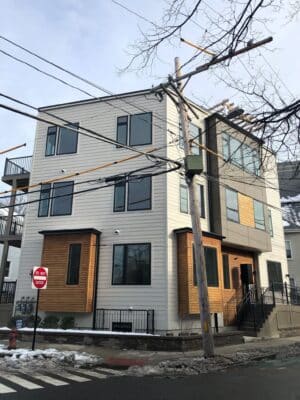
Somerville Community Land Trust’s first project at 7 Summer St. in Union Square created five income-restricted condominiums acquired by buyers last summer for $264,000 to $380,000. Photo courtesy of Somerville Community Land Trust
Community land trusts offer a unique housing model that creates affordable home ownership with reduced foreclosure risk and a role for residents in property decision-making.
Land trusts have generated hundreds of permanently affordable units in Boston, prompting organizers in surrounding communities including Chelsea and Somerville to seek land acquisitions that could replicate the model and stabilize gentrifying neighborhoods.
But programs specifically benefiting community land trusts were notably absent from the 33 financial and policy recommendations in Gov. Maura Healey’s $4 billion housing Affordable Homes Act unveiled in October. Advocates say it’s a missed opportunity to expand a model that’s shown a track record of success in Boston and across the U.S. for decades, and is showing early signs of promise in surrounding communities.
“That is really the missing piece of the equation,” said Lydia Lowe, executive director of the Chinatown Community Land Trust in Boston. “When you’re doing this type of acquisition, you can’t necessarily wait for an annual housing award.”
Community land trusts often rely on off-market transactions to acquire overlooked properties, pointing to the need for an acquisition fund to anticipate unexpected opportunities. The Chinatown CLT made its most recent acquisition in June after a member spotted a flier posted at a Chinatown food court advertising a four-unit rowhouse.
“Since it hadn’t been listed on the MLS, it was a fairly straightforward process,” Lowe said. “Every time a property has been on the market, we’ve lost out to an investor-buyer.”
Chinatown CLT closed on the $1.5 million acquisition of 8 Oxford Place in July. It’s in the initial stages of planning repairs and a future governance structure.
The organization previously acquired rowhouses at 29 Oak St. and 95 Hudson St. containing seven units, which were sold as condominiums with permanent affordability.
And in Chelsea, Comunidades Enraizadas Community Land Trust was created in the 2000s by Latina immigrants organizing against foreclosures and displacement. The group hasn’t made any acquisitions, but plans to seek properties for housing and environmental justice in partnership with environmental group GreenRoots, according to The Boston Foundation report.
Advantages of Dual Ownership Structure
The Boston Foundation’s 2023 Greater Boston Housing Report Card recently spotlighted the unique ownership and governance structure of community land trusts, and the advantages they offer over other prevalent affordable housing models.
The land trust typically acquires the property and creates a separate ground lease for the building before selling or renting to residents. The separation of land ownership and housing offers protection to residents, said Ben Baldwin, executive director of the Somerville Community Land Trust.
“It’s run a little bit more like a co-op, where people are deeply involved in the organization,” Baldwin said. “The longer-term involvement for the CLT as landowner means that if problems arise in the mortgage or tax delinquency, the CLT is there all along and can step in.”
Somerville Community Land Trust tapped into the city’s affordable housing trust fund to acquire its first property at 7 Summer St. in Union Square in 2022, receiving hundreds of applications for the five available condominiums. The units were restricted to households earning 80 and 110 percent of area median income, and sold for $264,000 to $380,000, respectively. A 15-member board of directors including five residents was elected this fall to oversee the property’s future management.
The organization is preparing to acquire an additional six-unit property in early 2024. Baldwin, Somerville Community Land Trust’s executive director, said the undisclosed property is an existing apartment building.
Community land trusts also offer a track record of protecting residents from foreclosure protection, said Sharon Cho, director of the Roxbury-based Dudley Neighbors Inc.
The organization is one of the nation’s oldest CLTs, formed in 1988 to create affordable housing on 62 acres of largely vacant land in Roxbury and Dorchester where it was given eminent domain authority by the then-Boston Redevelopment Authority, now the Boston Planning & Development Agency.
Dudley Neighbors Inc. currently oversees 228 units of rental and home ownership housing.

Steve Adams
The community land trust model was selected by residents, some of whom had been displaced by gentrification in South End, as the best opportunity to stabilize the new housing developments, Cho said.
“They had that foresight: ‘This is what happens if we don’t create protections,’” Cho said.
A key element of the CLT stabilization model is the dual ownership of land and housing, which gives the land trust veto power over risky homeowner mortgages as a foreclosure prevention strategy.
“We won’t consent to predatory loans, and we also have the right to first purchase,” Cho said. “It’s a backstop to make sure the property won’t go to a speculator.”
No properties in the Dudley Neighbors Inc. portfolio were foreclosed upon during the 2008 financial crisis, Cho said.
CLTs permanent deed restrictions guarantee that units don’t lose their income-restricted status, in contrast to conventional affordable housing developments by private or nonprofit developers using federal tax credits. Investment analyst Moody’s predicts that 188,000 affordable housing units nationwide will lose their income-restricted status by 2028 as low-income tax credits received by developers expire.
Lack of State Funding Limits Growth
The Boston Foundation report also highlighted the obstacles to CLTs’ growth, starting with the lack of a dedicated state program. Currently, CLTs rely heavily on local sources, where they compete with nonprofit developers and others for limited funding.
The CommonWealth Builder program is the state’s primary subsidy for developers building affordable home ownership units, targeting the economically challenged Gateway Cities, Boston and a handful of other communities of color. But the program’s guidelines call for the deed restrictions on affordability to expire after 15 years, creating an opportunity for residents to build wealth by selling the properties at market rate. That conflicts with the community land trust model, designed to stabilize neighborhoods through permanent deed restrictions.
A Healey administration spokesperson pointed to two state programs that CLTs could tap into for acquisitions: the Affordable Homes Act contains a $275 million bond authorization for sustainable and green housing initiatives. And a $1 million earmark in the 2022 economic development bill is designated for a small properties acquisition fund pilot with loans to subsidize acquisitions of one- to eight-unit residential buildings.






